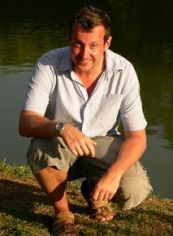Meet our research fellows
- Antony Dodd
- Kerry Franklin
- Martin Genner
- Christos Ioannou
- Andy Radford
- Nicholas Roberts
- Patricia Sanchez-Baracaldo
- Heather Whitney
Antony Dodd

Current position: Research Fellow (Proleptic Lecturer)
Fellowship: Royal Society URF
Research area: Circadian biology and cell signalling
Why did you choose to hold your fellowship at the University of Bristol?
I was attracted to the collaborative and collegiate nature of the School of Biological Sciences, because I think collegiality is an incredibly important part of scientific progress. I was also attracted to the subject areas of many academics in the School, both within my specific area (plant physiology and cell biology) and the broader theme of how organisms interact with their environment. Finally, Bristol is a vibrant and interesting place to live.
How has your time at Bristol helped you to develop your career?
I've gained a permanent academic position by moving to Bristol. However, my career has benefited for other less obvious reasons; for example I have received excellent guidance from colleagues during the preparation of publications.
What advice would you offer someone considering transferring an independent research fellowship to Bristol?
Relocating is stressful and can temporarily affect your research productivity, but examine the bigger picture and think about what will work for you in the long term.
Kerry Franklin

Current position: Senior Research Fellow (Proleptic Lecturer)
Fellowship: Royal Society URF
Research area: Environmental regulation of plant development
Martin Genner

Current position: Senior Lecturer
Fellowship: Great Western Research Fellowship (2007-2010)
Research area: Fish Ecology and Evolution
Why did you choose to hold your fellowship at the University of Bristol?
Not applicable. (The GWR fellowship was based at Bristol)
How has your time at Bristol helped you to develop your career?
I have been able to pursue research interests both applied and non-applied research areas, while gradually building up teaching and administrative roles now essential for academic career development in a University environment.
What advice would you offer someone considering transferring an independent research fellowship to Bristol?
Do get in touch with us. Ask about the research facilities available, the potential collaborations within the University, and the support we can provide for follow-on grant writing and career development.
Christos Ioannou

Current position: Research Fellow (Proleptic Lecturer)
Fellowship: NERC Advanced Fellowship
Research area: Experimental studies in collective and predator behaviour
Why did you choose to hold your fellowship at the University of Bristol?
Biological Sciences at Bristol is one of the strongest departments for animal behaviour in the world so is an obvious choice for anyone in this field of study. I also knew before coming here that there is a lot of support available for career progression and grant applications. Bristol is also a great city to live in.
How has your time at Bristol helped you to develop your career?
My fellowship at Bristol has given me the time and freedom to finish projects and get the papers out and published. I've developed new experiments with collaborators both here in the department of biology and in other departments (psychology, computer science), with support from the Animal Services Unit. I have also being able to submit an application for an advanced fellowship with a help from other academics at the University and support staff, particularly RED (Research and Enterprise Development).
What advice would you offer someone considering transferring an independent research fellowship to Bristol?
Try and find out who are the relevant contacts as soon as possible; it's not always obvious that help is out there, and they can make the process much easier.
Andy Radford

Current position: Reader in Behavioural Ecology
Fellowship: BBSRC David Phillips (2005-2010)
Research area: Bioacoustics and Behavioural Ecology
Why did you choose to hold your fellowship at the University of Bristol?
The internationally recognised strength in Animal Behaviour, but also the prospect of collaborating with many people in related, but different fields; the broad research remit of the School of Biological Sciences provides an unusual opportunity in this regard. They also offered me a permanent job!
How has your time at Bristol helped you to develop your career?
I have been drawn out of my comfort zone and ended up involved in a diversity of exciting projects that include collaborations across a range of disciplines such as theoretical modelling, physics, genomics, psychology and robotics. I have received excellent mentoring and support, not just in terms of research, but in developing all aspects of my academic career.
What advice would you offer someone considering transferring an independent research fellowship to Bristol?
Come and visit us; ask loads of questions (both when visiting and when you transfer); get involved in as much as possible.
Nicholas Roberts

Current position: Senior Research Fellow (Proleptic Lecturer)
Fellowship: BBSRC David Phillips
Research area: Detection of light and colour in nature
Why did you choose to hold your fellowship at the University of Bristol?
From the first time I visited Bristol, I knew that this was the place I wanted to work. Bristol has one of the broadest and best groupings of vision science researchers in the world; the profile of the Bristol Vision Institute was the perfect match for my research.
How has your time at Bristol helped you to develop your career?
The support I’ve had from colleagues in Biological Sciences, Physics, Electrical Engineering and Psychology has been incredible. It has helped me obtain a permanent position here, and opened some really exciting collaborations and new research directions.
What advice would you offer someone considering transferring an independent research fellowship to Bristol?
The University of Bristol has shown its commitment to Biological Sciences with the investment in the new Life Sciences building and associated research facilities. Now is a great time to come to Bristol and make the most of these amazing new facilities.
Patricia Sanchez-Baracaldo

Current position: Research Fellow (Proleptic Lecturer)
Fellowship: Royal Society Dorothy Hodgkin
Research area: The early co-evolution of life
Why did you choose to hold your fellowship at the University of Bristol?
After having my family, I had a career break and when I decided to get back into Science, the School of Biological Sciences were very supportive. With their support, I was able to get a Daphne Jackson fellowship; this later on gave me the confidence to apply for a Royal Society Dorothy Hodgkin Fellowship.
How has your time at Bristol helped you to develop your career?
I am passionate about interdisciplinary research and working at Bristol has enabled me to work across different departments. My research ranges from evolutionary biology, ecology, geochemistry and climate change. The Faculty of Science offers many opportunities to interact and network so it is ideal for developing cutting edge research.
What advice would you offer someone considering transferring an independent research fellowship to Bristol?
Identify people you are most likely to work with, get in touch and visit. Having people to interact with will be key in getting started as well as developing your interests.
Heather Whitney

Current position: Research Fellow (Proleptic Lecturer)
Fellowship: ERC
Research area: Plant surface interactions and Behavioural Ecology
Why did you choose to hold your fellowship at the University of Bristol?
The main draw was the diversity and reputation of the research at the University, both within the School of Biological Sciences and within the wider Faculties of Science and Engineering. Within the School of Biological Sciences the research ranges from genomics and plant molecular biology, through whole organism biology (including animal behaviour and vision) through to pollination ecology. As my research touches on all these fields, it made the department an ideal place for me.
How has your time at Bristol helped you to develop your career?
I was given a lot of help by the EU team at RED when applying for the fellowship I hold now (an ERC starting grant). The RED people understood the process and gave me a lot of support throughout my application. I have also benefitted from the strong interdisciplinary links that are set up between different schools and faculties at the university. These links are actively encouraged by the University through doctoral training programs and cross-faculty institutes such as NSQI.
What advice would you offer someone considering transferring an independent research fellowship to Bristol?
Talk to people from as many departments as possible; the diversity of the research happening in the University means there are both people you could collaborate with, and facilities you could use, across departments.